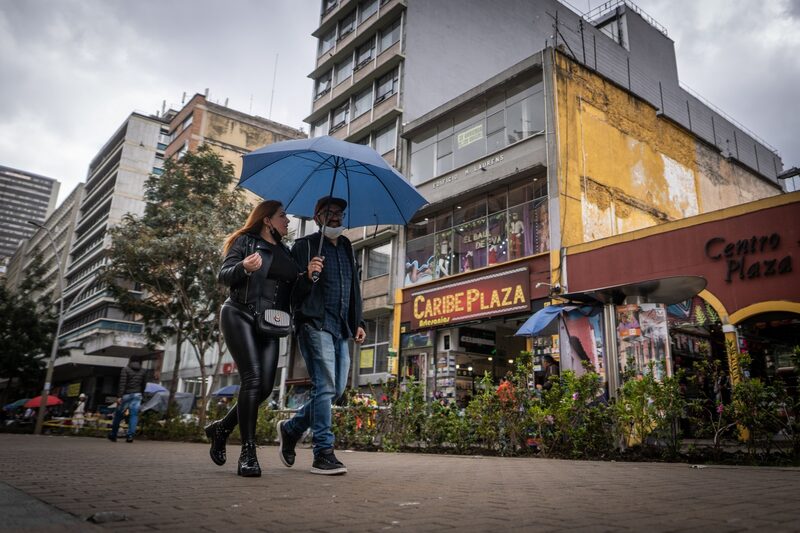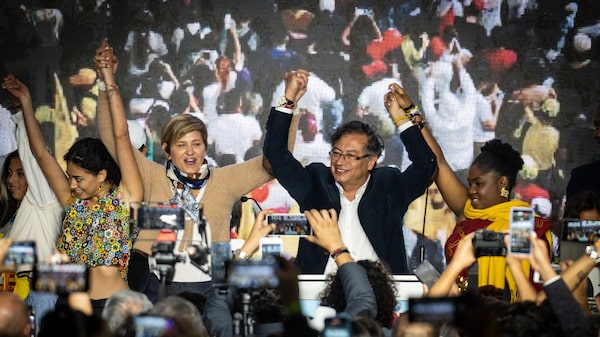Bloomberg — Now that Gustavo Petro has won Colombia’s presidential election, nervous investors are focused on who he names as finance minister for clues on how the leftist would govern.
The nation’s stocks, bonds and currency sold off when markets re-opened Tuesday after a holiday, as traders reacted to the June 19 election result.
Petro’s plans to halt oil exploration and overhaul the pension system while increasing taxes have spooked some business people and holders of Colombian assets, but whether the sell-off continues in the coming days is likely to depend on his cabinet picks.
Petro’s finance chief will need to maintain investor confidence and at the same time have the political gravitas to advance the agenda of the president, which includes increased welfare payments for millions of poor Colombians.
Should he name this week a finance chief who is respected and from outside his close circle of advisers, that would likely calm markets, according to Andres Pardo, chief Latin America macro strategist at XP Investments.
Here are some of the main candidates for the job:
Alejandro Gaviria
The US-educated economist Alejandro Gaviria would be one of the most experienced picks for Finance Minister, having served as Colombia’s health minister from 2012 to 2018 and then as head of the nation’s top university. He was included in a shortlist mentioned by Petro before the election.
Gaviria, 55, holds a Ph.D. in Economics from the University of California San Diego and ran for president this year in an attempt to challenge Petro, but lost the primary in his centrist coalition in March.
Of all the main candidates for the role of Petro’s finance minister, Gaviria is the one who is most likely to reassure markets, said Scotiabank Colpatria economist Sergio Olarte.
Gaviria, who sees market economy and business freedom as “essential” for Colombia’s well-being, is married to Carolina Soto, a respected economist and until recently member of the central bank’s board.
Ricardo Bonilla
Ricardo Bonilla served as Bogota’s secretary of finance when Petro was mayor of the country’s capital, and was one of his top economic advisers during the presidential campaign.
As mayor, Petro had a large turnover of staff in key positions, but he never fell out with Bonilla, suggesting that the pair have a close relationship.
Petro and Bonilla presided over a slight fall in Bogota’s debt burden when they were in office from 2012 to 2015. During the campaign, the adviser said that Petro will run a fiscally responsible government and argued that the nation needs to boost tax revenue to fund social programs and cut the fiscal deficit.
Bonilla, who is closer to Keynesian ideas, would have a harder time than Gaviria would in maintaining investors’ confidence, according to Scotiabank’s Olarte.
Luis Fernando Medina
Luis Fernando Medina, 53, is a Stanford University-educated economist who during the campaign also sought to send a message that Petro would be fiscally responsible in office.
Medina is one of Colombia’s best-known leftist economists and has written books including “Socialism, History and Utopia” and “Red Phoenix: The Opportunities of Socialism”.
During the campaign, he said that fears that Petro would run up large debts were misplaced. On the contrary, his plan ought to reassure owners of Colombian assets “because we are going to be serious both in terms of fiscal consolidation and in terms of boosting productivity,” he said.
Medina has taught at the University of Chicago, and Universidad Carlos III of Madrid, among other schools. At Stanford, the principal adviser on his Ph.D. was the Nobel Prize winner Kenneth Arrow.
Jose Antonio Ocampo
Yale-educated Jose Antonio Ocampo, 69, is perhaps Colombia’s best-known economist, and currently teaches at Columbia University. He has co-authored books with Nobel laureate Joseph Stiglitz and much of his published work focuses on the need for policies to limit the damage caused to developing nations by commodities cycles.
Ocampo has argued for a more “active” use of the exchange rate and has said that a tax on commodities exports could mitigate de-industrialization caused by real exchange rate appreciation. He served as finance minister in the 1990s, as well as agriculture minister and head of the National Planning Department.
Since he has already been finance minister, it is unclear whether he wants the job. He declined to comment.
Luis Jorge Garay
Luis Jorge Garay is an engineer from Bogota’s Andes University who holds a Ph.D. in economics from the Massachusetts Institute of Technology.
He has been adviser to the Inter-American Development Bank, the Finance Ministry and the Trade Ministry, among other institutions.
When the Covid-19 pandemic hit, he argued for a more active role of the government to help the poorest, and last year he pushed for a permanent basic income for the vulnerable financed by government bonds to be bought by the central bank.
Cecilia Lopez
Cecilia Lopez, 79, was the only woman included in Petro’s shortlist of economists who could lead the Finance Ministry.
A member of the Liberal Party, she served as agriculture and environment minister in the 1990s, and was a senator from 2006 to 2010.
Other Candidates
Petro also mentioned Rudolf Hommes and Jorge Ivan Gonzalez as potential ministers.
Hommes, 78, was already finance minister during the government of liberal president Cesar Gaviria. Gonzalez is a Belgian-educated economist who teaches at Javeriana University in Bogota. He’s has published research on fiscal policy, macroeconomics, transport fees and education, among other topics.




